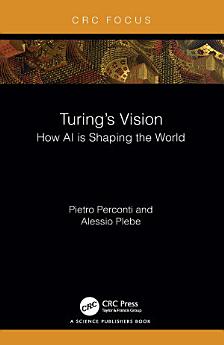Turing's Vision: How AI is Shaping the World
About this ebook
The book is intended for scholars, researchers, and readers intrigued by the intersections across disciplines interested in understanding the philosophical, ethical, and social implications of Artificial Intelligence and its impact on human nature.
About the author
Pietro Perconti is Professor of Philosophy of Mind at the University of Messina. He co-founded the ICCS, International Center for Consciousness Studies (hardproblem.it). His previous books include Kantian Linguistics (Nodus, 1999) and The Future of the Artificial Mind (with Alessio Plebe, CRC, 2022). His research interests include social cognition, consciousness, and the social role of cognitive science.
Alessio Plebe received a degree in Electronic Engineering in 1981 from the University of Rome and a PhD in Philosophy of Language from the University of Palermo in 2004. He is Professor of Philosophy of Science at the University of Messina. He co-founded the ICCS, International Center for Consciousness Studies. His main research areas are neural computation, its epistemology, and its explanatory power for several cognitive functions. Currently, he is investigating the rise of deep learning, its causes and its impact on philosophy and cognitive science. An updated picture of what artificial intelligence is becoming nowadays is in his recent book, authored with Pietro Perconti, The Future of the Artificial Mind.




